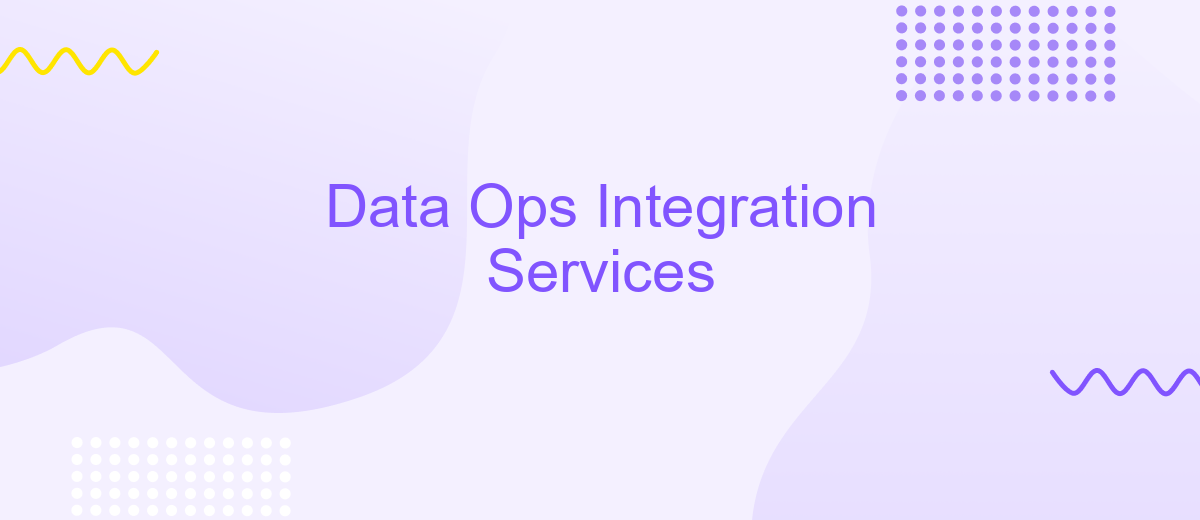Data Ops Integration Services
In today's data-driven world, seamless integration and efficient management of data operations are crucial for business success. Data Ops Integration Services offer a comprehensive solution to streamline data workflows, enhance collaboration, and ensure data quality. By leveraging advanced tools and methodologies, these services empower organizations to optimize their data processes, driving better insights and informed decision-making.
Introduction
In today's fast-paced digital landscape, businesses are increasingly relying on data to drive decision-making and operational efficiency. Data Ops Integration Services play a crucial role in ensuring that data flows seamlessly across various systems, enabling organizations to harness the full potential of their data assets. These services bridge the gap between data generation and data utilization, streamlining processes and enhancing data quality.
- Facilitating real-time data integration across multiple platforms
- Ensuring data accuracy, consistency, and reliability
- Automating data workflows to reduce manual intervention
- Enhancing data security and compliance measures
By implementing Data Ops Integration Services, companies can achieve a more agile and responsive data infrastructure. This not only improves operational efficiency but also provides a competitive edge in the market. As data continues to grow in volume and complexity, the importance of robust integration services becomes even more critical. Embracing these solutions allows organizations to stay ahead of the curve and make data-driven decisions with confidence.
DataOps Integration Concepts

DataOps integration is a crucial aspect of modern data management, aimed at streamlining and automating data workflows. It involves the seamless integration of data from various sources, ensuring consistency, quality, and accessibility. By leveraging DataOps, organizations can enhance data collaboration, reduce errors, and accelerate data delivery. Key concepts include data pipeline automation, real-time monitoring, and continuous integration and delivery (CI/CD) of data processes, ensuring that data is always up-to-date and readily available for analysis.
One effective tool for implementing DataOps integration is ApiX-Drive. This service allows for the easy connection of various data sources and applications without requiring extensive coding knowledge. ApiX-Drive supports automated data synchronization, enabling real-time data updates and reducing manual intervention. By using such tools, organizations can achieve efficient data integration, minimize downtime, and ensure that their data operations are scalable and resilient. Overall, DataOps integration concepts focus on creating a robust data infrastructure that supports agile and data-driven decision-making processes.
Implementation Considerations

When implementing Data Ops Integration Services, several key considerations must be taken into account to ensure a successful deployment. Proper planning and execution are critical to streamline data workflows and enhance operational efficiency.
- Data Quality: Ensuring high data quality is paramount. Implement robust data validation and cleansing processes to maintain accuracy and reliability.
- Scalability: Design the system to scale with growing data volumes and increasing complexity. Choose scalable technologies and architectures.
- Security: Implement stringent security measures to protect sensitive data. Ensure compliance with relevant regulations and standards.
- Automation: Leverage automation to minimize manual intervention. Use automated workflows and tools to enhance efficiency and reduce errors.
- Collaboration: Foster collaboration between data engineers, analysts, and other stakeholders. Use collaborative tools to facilitate communication and knowledge sharing.
By addressing these considerations, organizations can effectively implement Data Ops Integration Services, leading to improved data management processes and better decision-making capabilities. Careful planning and adherence to best practices are essential for maximizing the benefits of Data Ops.
Benefits and Impact

Data Ops Integration Services offer a transformative approach to managing and optimizing data workflows. By automating and streamlining data processes, organizations can significantly reduce manual efforts, leading to increased efficiency and productivity. This integration ensures that data is consistently accurate, up-to-date, and readily available for decision-making.
Moreover, these services enhance collaboration between data engineers, analysts, and other stakeholders. By providing a unified platform, Data Ops Integration Services facilitate seamless communication and coordination, eliminating silos and fostering a data-driven culture within the organization.
- Improved data quality and consistency
- Faster data processing and analysis
- Enhanced collaboration and communication
- Reduced operational costs and manual errors
- Increased agility and scalability
Ultimately, the impact of Data Ops Integration Services is profound, enabling businesses to harness the full potential of their data assets. By leveraging these services, organizations can make more informed decisions, drive innovation, and maintain a competitive edge in an increasingly data-centric world.
- Automate the work of an online store or landing
- Empower through integration
- Don't spend money on programmers and integrators
- Save time by automating routine tasks
Conclusion
In conclusion, the integration of Data Ops services plays a crucial role in streamlining data workflows and enhancing the overall efficiency of data management processes. By utilizing platforms such as ApiX-Drive, organizations can seamlessly connect various data sources, automate data transfers, and ensure real-time data synchronization. This not only reduces manual efforts but also minimizes the risk of errors, leading to more reliable and accurate data insights.
Moreover, adopting robust Data Ops integration services allows businesses to scale their operations effectively, adapt to evolving data needs, and maintain a competitive edge in the market. As data continues to grow in volume and complexity, leveraging advanced integration tools will be essential for organizations aiming to harness the full potential of their data assets. Investing in solutions like ApiX-Drive can provide the flexibility and scalability needed to meet these challenges, ultimately driving better decision-making and business outcomes.
FAQ
What is Data Ops Integration?
How can I automate data integration between different platforms?
What are some common use cases for Data Ops Integration?
How do integration services handle data security?
Can I customize data workflows to fit my specific needs?
Routine tasks take a lot of time from employees? Do they burn out, do not have enough working day for the main duties and important things? Do you understand that the only way out of this situation in modern realities is automation? Try Apix-Drive for free and make sure that the online connector in 5 minutes of setting up integration will remove a significant part of the routine from your life and free up time for you and your employees.


